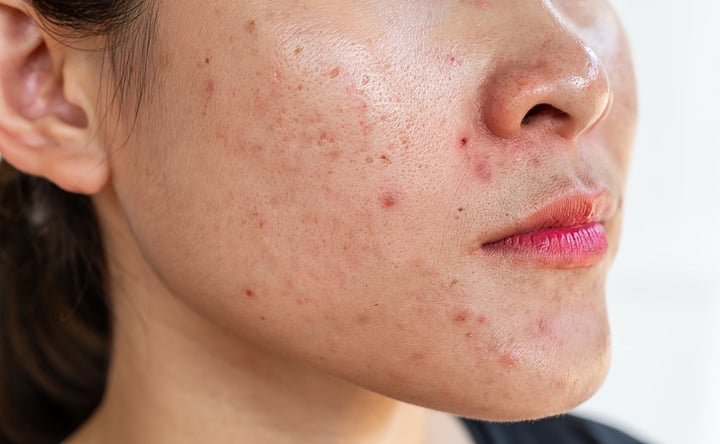成人のざ瘡は摂食障害リスク上昇と関連
不安、抑うつ、身体醜形障害の既往を考慮すると弱まるものの、有意な関連が認められる
米イェール大学医学部のMichael R. Nock氏らは、ざ瘡と摂食障害の関連を検討した。2017年5月31日~2022年7月1日の間にAll of Us研究プログラムに参加した米国成人28万7,011人の電子カルテのデータを解析対象となり、そのうち7,394人はざ瘡を有していた。
解析の結果、人口統計学的因子で調整した後、ざ瘡は摂食障害と有意に関連していた(調整オッズ比2.43)。不安、抑うつ、身体醜形障害の既往歴で調整すると関連が大幅に弱まったが、全体的な関連は有意なままであった(同1.65)。女性に関してのみ、年齢層、申告された遺伝的および民族的特性、性的マイノリティ特性、所得水準を問わず、この有意な関連が維持された。
共著者である同大学のJeffrey M. Cohen氏は、「本研究で得られた知見は、医師がざ瘡患者を診療する際、摂食障害の徴候に注意し、全人的かつ包括的な治療を行うのに役立つだろう。摂食障害の兆候または症状がある人は、ざ瘡の有無にかかわらず医療機関を受診することを強くすすめる」とヘルスデーニュースに語った。
なお1人の著者が、アドバラ社、ノバルティス社、武田薬品工業、GSK社との利益相反(COI)に関する情報を明らかにしている。
Journal of the European Academy of Dermatology and Venereology


Adult Acne Linked to Higher Risk for Eating Disorders
Findings attenuated but still significant after allowing for history of anxiety, depression, body dysmorphic disorder
WEDNESDAY, April 30, 2025 (HealthDay News) -- Adults with acne have a higher likelihood of having eating disorders, according to a letter to the editor published online April 16 in the Journal of the European Academy of Dermatology & Venereology.
Michael R. Nock, from the Yale School of Medicine in New Haven, Connecticut, and colleagues examined the association between acne and eating disorders. The analysis included electronic health record data from 287,011 U.S. adults participating in the All of Us Research Program between May 31, 2017, and July 1, 2022, including 7,394 participants with acne.
The researchers found that after adjusting for demographic factors, acne was significantly associated with having an eating disorder (adjusted odds ratio, 2.43). While the association was substantially attenuated by history of anxiety, depression, and/or body dysmorphic disorder, the overall association remained significant (adjusted odds ratio, 1.65). Among only women, the association remained significant across age groups, reported ancestral and ethnic identities, sexual gender minority identities, and income levels.
"Our findings will help physicians caring for individuals with acne to be attentive to signs of eating disorders to provide holistic and comprehensive care to patients," coauthor Jeffrey M. Cohen, M.D., also from the Yale School of Medicine, told HealthDay. "We strongly encourage anyone experiencing signs or symptoms of an eating disorder, regardless of whether that person also has acne, to seek professional care."
One author disclosed ties to Advarra, Novartis, Takeda, and GSK.
Journal of the European Academy of Dermatology and Venereology


